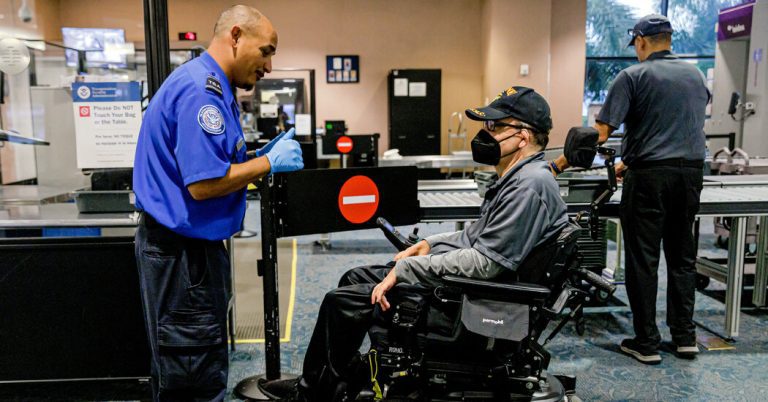The Biden administration announced Thursday that it has proposed new regulations on how airlines must treat passengers in wheelchairs, an effort aimed at improving air travel for people with disabilities.
Under the proposal, damaging or delaying the return of a wheelchair would be an automatic violation of an existing federal law that prohibits airlines from discriminating against people with disabilities. The Department of Transportation said the change would make it easier for the agency to penalize airlines for wheelchair mishandling.
The proposed regulations would also require more robust training for employees who physically assist passengers with disabilities or operate their wheelchairs.
“There are millions of Americans with disabilities who are not traveling by air because of poor airline practices and inadequate government regulations, but now we plan to change that,” said Transportation Secretary Pete Buttigieg. “This new rule will change the way airlines operate to ensure that travelers who use wheelchairs can travel safely and with dignity.”
For people in wheelchairs, flying can be difficult and uncomfortable, and airline mishaps can make for an even more harrowing experience. More than 11,000 wheelchairs and scooters were mishandled by airlines last year, according to figures reported to the Department for Transport.
The proposed regulations add to previous moves by the Biden administration aimed at improving the flying experience for travelers with disabilities. In 2022, the Department of Transportation published a bill of rights for airline passengers with disabilities. Last year, the agency finalized new regulations requiring more commercial aircraft to have accessible bathrooms.
Sen. Tammy Duckworth of Illinois, a former Army helicopter pilot who uses a wheelchair after losing both legs in the Iraq war, noted that airlines had previously fought unsuccessfully against a rule requiring them to disclose the number of mishandled wheelchairs and scooters. Ms. Duckworth said that since airlines began reporting these numbers several years ago, she had seen improvements at airports across the country.
Ms. Duckworth, a Democrat and chairwoman of the Senate Commerce Committee’s aviation subcommittee, said she hoped the proposed regulations would lead to a higher level of accountability for airlines. However, he added that Congress should take steps to protect the policies the Biden administration is moving to implement.
“This rule could be overturned by a future Department of Transportation under a different administration,” said Ms. Duckworth, who attended a White House event Thursday where Mr. Buttigieg discussed the new proposal.
At the event, Carl Blake, the executive director of Paralyzed Veterans of America, which has asked the Department of Transportation to develop new regulations to improve the boarding and deplaning process for passengers with disabilities, said he had never met a member of the organization who flew and whose wheelchair was not damaged at one point or another.
Mr Blake said the problem urgently needed to be tackled and stressed the importance of using the new regulations to hold airlines to account. “A rule without enforcement is no rule,” he said.
In a statement, a spokesman for Airlines for America, a trade group representing the nation’s largest carriers, said airlines have taken steps to improve the flying experience for passengers with disabilities through steps such as enhancing employee training.
“U.S. airlines are committed to providing a high level of customer service and providing a positive and safe flying experience for passengers with disabilities,” said spokeswoman Hannah Walden.
Public comments on the proposed regulations will be accepted for 60 days. The Transport Department did not specify a timetable for when the new measures could be finalised.




